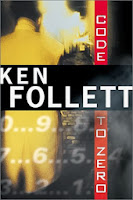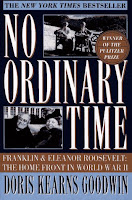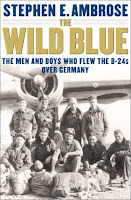D-Day June 6, 1944: The Climactic Battle of World War II by Stephen Ambrose
Published: 1994
Rating: 4
Goodreads
I bought this at the humongous Strand Book Store in New York City in June of this year. It is a chronologically detailed account of D-Day: the Allied invasion of Hitler's Fortress Europe on June 6, 1944.
What I learned:
- Eisenhower's fateful decision to go ahead despite the horrible weather conditions.
- The paratrooper's missions behind enemy lines were critical. Many were dropped miles from their intended areas.
- Role of mini-subs and minesweepers
- Engineers who blew up beachhead obstacles were no less courageous than infantry soldiers.
- Unbelievably detailed planning - down to the minute.
- The training of troops for amphibious landing.
- The horrible seasickness onboard the landing crafts - the soldiers were eager to get off
- Carnage on Omaha Beach.
- Brave decisions/actions of junior officers and NCO's made the difference. If they stopped, the invasion would have failed.
Germans
- Almost all senior leaders like Rommel were away.
- Hitler was the only one who could release the Panzer tanks to the front and he was not awakened when the invasion began.
- Operation Double-Cross was wildly successful - the Germans were convinced the real invasion would occur at the heavily fortified Calais.
- Troops were very slow to react. Many frontline soldiers were conscripted Russians and Poles, who surrendered easily.
- The Atlantic Wall was the main defense - once it was breached by the Allied forces, it was only a matter of time before Germany fell.
- Hitler did not use his new V-1 bombs on the beaches, nor were the Allied ships attacked by U-boats.
Allied forces
- Control over air and sea was critical for success.
- Came to France as liberators, fighting for freedom.
- Troops were made up of citizen soldiers who fought as courageously and grit as the professional German army.
I recently watched and would highly recommend the Oscar winning 1962 movie about D-day called The Longest Day.
Soldier From the War Returning: The Greatest Generation's Troubled Homecoming from World War II by Thomas Childers
Published: 2009
Rating: 4
Goodreads
As opposed to Tom Brokaw's rosy accounts of returning GI's in The Greatest Generation, Childer's excellent book paints a more realistic picture.
As the only son of a WWII veteran, Childer's knows firsthand of what he says in the introduction: "wars are not clean or neat, and neither is their aftermath."
After years of research, he traveled and spoke on this topic which elicited heartfelt responses and confessions, reinforcing Childer's belief that WWII had a far greater negative impact on the veterans and their families than history has led us to believe. His aim was to tell a truer story - I believe he succeeded.
Sample stats:
- In 1947, unemployment of veterans was triple that of civilians.
- Post war housing was hard to find. In early 1946, an estimated 1.5 million veterans were living with family or friends.
- Civilians grew weary of veteran's complaints and needs.
- Divorce boon in the two years right after the war.
- PTSD was not a recognized diagnosis at the time but veterans exhibited all the classic symptoms: depressions, recurring nightmares, survivor's guilt, unexplained rage, extreme anxiety.
There are times when war may be necessary. With all its horrors and grotesque crimes, the Second World War is a case in point. But if, as a last resort, we send soldier's into harm's way, we should be under no illusion about war's colossal human costs, remembering that even in the most brilliant triumphs there is heartbreak and that the suffering does not stop when the shooting does.One only has to read a few brutally honest memoirs of WWII veterans who fought in North Africa, Guadalcanal, Italy, Peleliu, France, or Iwo Jima to know the "Greatest Generation" could not come home unscathed.
My Son and the Afterlife: Conversations From the Other Side by Elisa Medhus, MD
Published: 2013
Rating: 4
Goodreads
I can't help feeling like I was led to this book - by Josh.
On December 18th, I was at the Dulles airport with a few minutes to spare before my plane took off. Although I had plenty of reading material, I stopped at a book kiosk and lo and behold, this book was on a shelf that I just happened to peruse. After reading the back jacket, I not only got the book but read it within a couple of days.
Dr. Elisa Medhus never believed in life after death. As an accomplished physician, she placed her faith in science. All of that changed after her son Erik took his own life and then reached out from the other side.
Intimate, heartbreaking, and illuminating, go on an incredible journey from grief and skepticism to healing and belief. Based on Medhus' wildly popular blog, ChannelingErik, My Son and the Afterlife provides answers to the most universal questions of being human.
At once tragic and uplifting, Erik speaks from the other side with candor, wisdom, and depth as he describes his own experiences and provides new answers about the nature of souls, death, and the afterlife - answers that have the potential to change our lives forever.Erik died on October 6, 2009 - almost 7 months after Josh. Have they met? I wonder. Soon after, she began communicating with him via mediums and started her blog.
The book is essentially a transcript of her questions and his answers (via medium). It is information overload: strange, surreal, and difficult to process. The following bullet points are what I wrote in my book journal:
- Afterlife is a reality
- Our two-dimensional (space and time) are a very small part of the overall reality
- Souls depart the physical body upon death but retain their essence, memories, everything that makes them unique.
- Souls want to remain connected to their loved ones on earth and are able to give signs, play pranks, show themselves and communicate
- Reincarnation exists
- Unconditional love for ourselves and others is the ultimate goal of being human
- This energy, life-force, soul, spirit exists in all living things: humans, plants, animals
Along with Dr. Eban Alexander's book, Proof of Heaven, there is much to ponder.










































